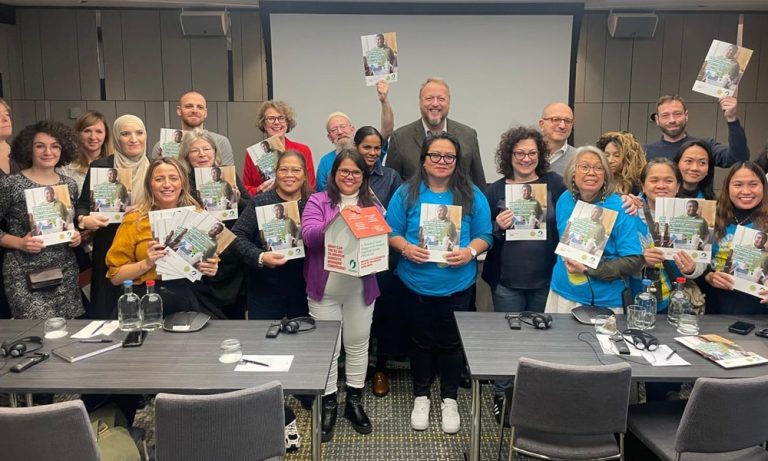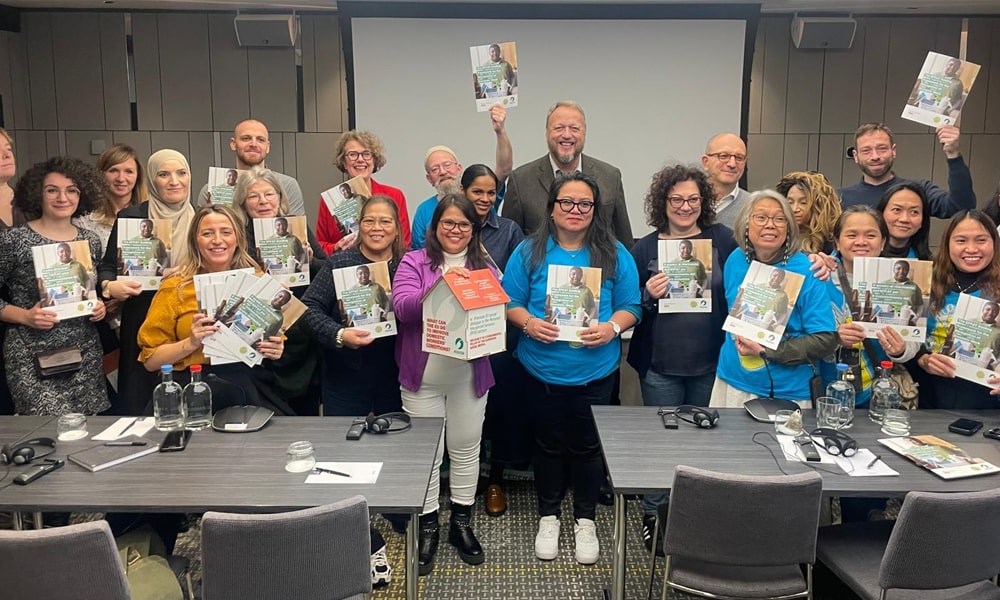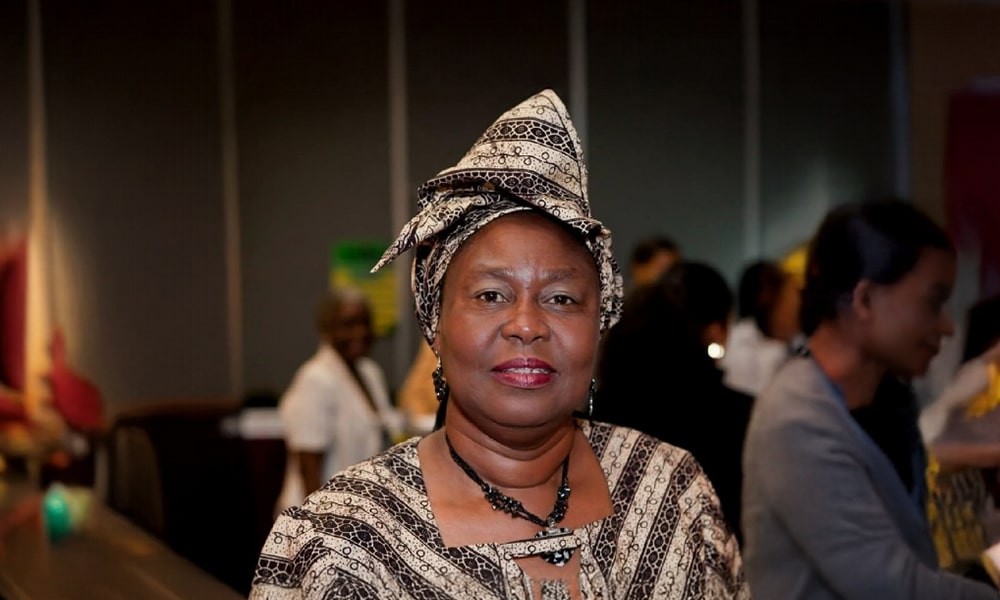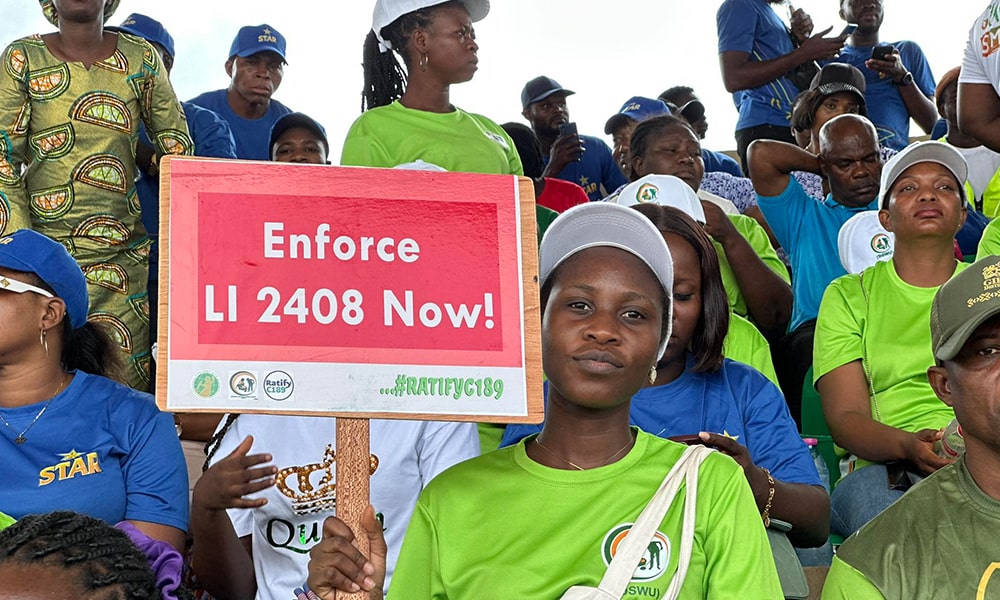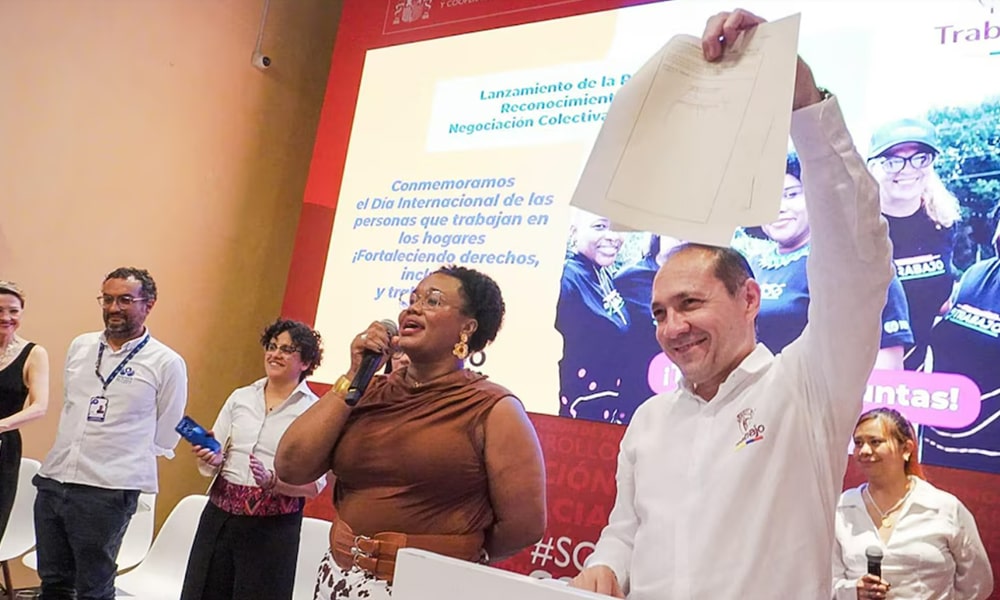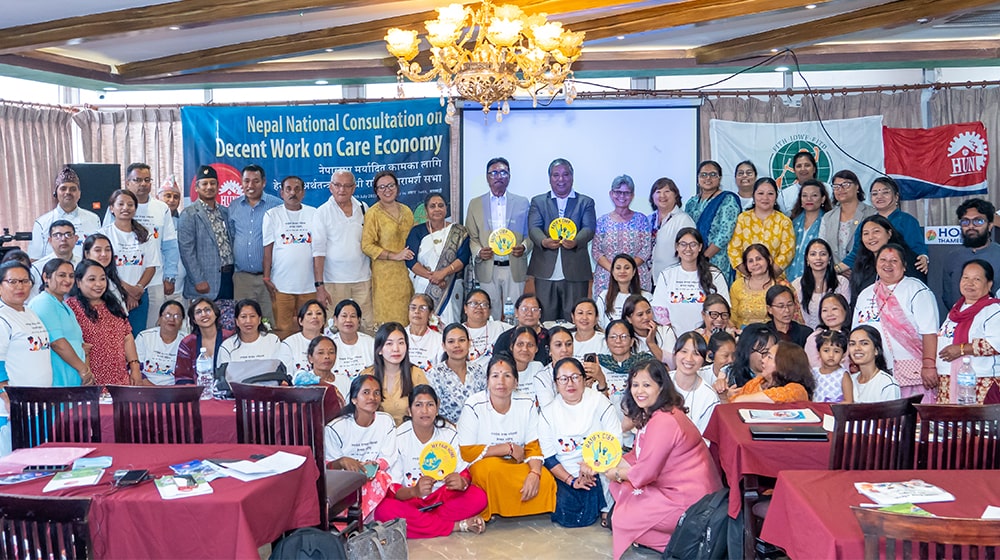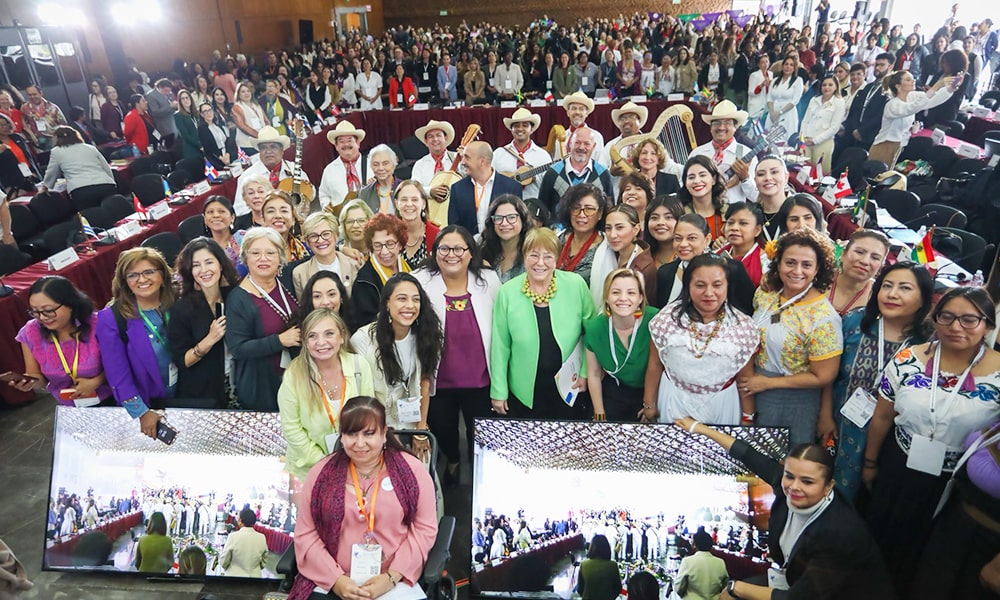
In just one week, domestic workers in the Americas achieved two victories that may prove a turning point in their working and living conditions. On August 7, the Inter-American Court of Human Rights recognized care as an autonomous human right. Eight days later, the Member States of the Economic Commission for Latin America and the Caribbean adopted the Tlatelolco Commitment, which establishes a decade of action to advance gender equality and the care society. Both decisions point to a new regional social contract that puts care and the rights of those who provide it at the center. It is now up to governments to implement—and we will keep pushing to ensure follow-through.
A paradigm shift for everyone
In a historic decision, the Inter-American Court of Human Rights (IACtHR) issued Advisory Opinion OC-31/25, which recognizes care as an autonomous human right, underscoring its basic, universal, and indispensable nature for life and for the functioning of society. This makes clear that care is not a privilege, a favor, or “help,” nor an individual responsibility confined to the private sphere. It means that all people have the right to receive and to provide care with dignity at all stages of life, and that the Member States of the Organization of American States (OAS) have the obligation to guarantee it.
The ruling considers that the autonomous right to care has three basic dimensions: 1) Right to be cared for: all people have the right to receive quality, sufficient, and appropriate care to live with dignity; 2) Right to care: all people have the right to provide care under dignified conditions, whether paid or unpaid, free from discrimination and with full respect for their human rights; 3) Right to self-care: those who provide and receive care have the right to look after their own well-being and address their physical, mental, emotional, and cultural needs.
Through this decision, the IACtHR introduces a paradigm shift: care—historically invisible and feminized—ceases to be considered a private task and becomes a public, collective, and social good that states must guarantee, under conditions of equality, non-discrimination, and co-responsibility, through laws, institutions, financing, and universal systems. The Court also notes that care is indispensable to the effective exercise of other rights, such as health, social protection, work, reproductive autonomy, gender equality, education, family protection, and human dignity.
The Advisory Opinion calls on states to: incorporate care into constitutional and legal frameworks and into national plans; design and strengthen universal, sustainable public care systems with a gender-responsive and intersectional approach, that include accessible, quality care services (childcare, care for older persons, care for persons with disabilities, parental leave, etc.); extend social protection coverage for those who provide care, including paid care workers in informal employment; and adopt co-responsibility measures that engage the State, communities, the market, and families, with sustained budgets, regulation, and accountability. These guidelines are key to building care systems in the Americas that are more just, equitable, sustainable, and comprehensive.
Domestic workers at the center of the care economy
In the Americas (North America, Latin America, and the Caribbean) about 18 million people are engaged in paid domestic work, 90% of whom are women, and two out of three are in informal employment, without access to social protection and other basic labor rights. Given the “historical invisibility” the sector faces, the IACtHR recognizes domestic workers as essential care providers and explicitly incorporates ILO Convention 189 as an authoritative reference on their rights, implying that this instrument should be the central pillar of all national care systems and policies. The contribution of the International Domestic Workers Federation (IDWF) to the Court’s consultative process—through its document “The Centrality of Care and Support from a Human Perspective”—was also substantial in informing the opinion.
Advisory Opinion OC-31/25 affirms that “paid care work must be afforded all guarantees derived from the right to work, given that these are activities with economic and social value carried out within subordinate, remunerated employment relationships.” It further specifies that “states must implement special measures to ensure that paid care workers, in whatever sectors they perform their work, enjoy the same rights as any other worker and can exercise them without discrimination, under just, equitable, and satisfactory conditions.”
Accordingly, the IACtHR urges countries in the region to adopt concrete measures, tailored to the particularities of domestic work, to effectively protect those who perform this work:
- Mandatory written contracts specifying working conditions.
- A maximum 8-hour workday, weekly rest, paid vacation, and overtime pay.
- Fair and equitable remuneration.
- Full access to social security, including for workers in informal employment (multi-employer registration, partial or sporadic contribution systems).
- Occupational safety and health protection.
- Prevention and sanction of abuse, harassment, violence, trafficking in persons, and servitude.
- Action against intersectional discrimination deriving from poverty, migration status, age, and gender.
- Effective access-to-justice mechanisms.
- Freedom of association and the right to collective bargaining as an essential avenue to guarantee rights.
- Labor inspection and sanctions for non-compliance.
- Initiatives to promote formalization.
- Positive measures to protect migrant domestic workers, who often perform their work “under coercion, in exploitative relationships contrary to their human dignity.”
Care is a right, but it is also work—and it must be decent work. That is why the IDWF welcomes this landmark that strengthens the Inter-American human rights framework, centers the rights of those who provide care, and legitimizes the contributions of the domestic workers movement. We now have another powerful tool to demand that governments move from words to action.
“Domestic workers are essential to the social and economic fabric of our societies. Yet they often face poor working conditions, low wages, and lack of access to social protection. That is why it is crucial to recognize their work as an integral part of the care system and to guarantee them adequate labor rights and social protection.”
Carmen Brítez, IDWF President
Tlatelolco Commitment: toward a care society in Latin America and the Caribbean
The XVI Regional Conference on Women in Latin America and the Caribbean concluded with a momentous development: the adoption of the Tlatelolco Commitment by the Member States of ECLAC, which establishes a 2025–2035 decade of action to accelerate the achievement of substantive gender equality and the care society in Latin America and the Caribbean through transformations in the political, economic, social, cultural, and environmental spheres.
Recognizing that “the current social organization of care in Latin America and the Caribbean is unjust and unequal, and has historically affected women, adolescents, and girls, particularly Indigenous and Afro-descendant women,” and in line with the IACtHR ruling, the countries of the region committed to:
- Recognize care as a human right and a public good that the State must guarantee.
- Value care as a social and economic pillar.
- Adopt laws, policies, programs, and comprehensive care systems with intersectional and intercultural approaches that are sustainable over time, implying investment in universal, quality care (childcare, care for older persons, and care for persons with disabilities).
- Promote a fairer social organization of care, advancing women’s autonomy and their equal participation in public, political, and economic life.
- Guarantee the full exercise of labor rights and access to social security for those who perform care work.
- Prevent all forms of violence in the world of work, both formal and informal.
- Ratify and implement ILO Conventions 189 and 190.
- Promote the formalization and professionalization of care work.
- Ensure the active participation of organizations of domestic workers and care workers in the design and oversight of care policies.
- Foster the inclusion of diverse women and the visibility of their ancestral knowledge.
The voice of domestic workers was heard in every space of the ECLAC Conference. A delegation composed of the IDWF General Secretary, Adriana Paz Ramírez, the IDWF Executive Committee representative for Latin America, Ruth Díaz, and leaders of domestic workers organizations in the region made substantial contributions that informed the Commitment and helped shape the regional care agenda. Our movement played a key role in the event’s high-level sessions, such as the “Memory and Future: 50 Years Since the First World Conference on Women” segment, featuring Adriana Paz among its speakers, and in the dialogue to advance the EU–LAC Bi-regional Pact for Care. At the Care Pavilion—an initiative of the Global Alliance for Care (GAC) to spur reflection and collective action—we hosted our own booth and participated in numerous debates. We also took part in the Alliance’s General Assembly through our President, Carmen Brítez.
“In this new era of care, domestic workers see many opportunities to transform the reality of the sector, but we also see real risks that our demands and needs may not be fully incorporated into national care plans and systems. It is important to look at the history of organizing and union-building in this sector as proof that real change is achieved from the bottom up—through the power of organizing and the active engagement of workers. If we understand care as a need, as work, and as a right, then we have a transformative philosophy and a framework for urgent action.”
Adriana Paz Ramírez, IDWF General Secretary
In a global context that challenges the full enjoyment of human rights, the Tlatelolco Commitment is much more than a roadmap: it is a turning point that brings us closer to the change we have long fought for—a true care society that recognizes the vital role of domestic workers, guarantees decent work, and respects everyone’s right to provide and receive care under dignified conditions.

